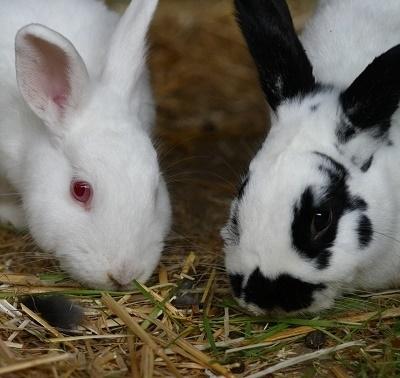In separate studies yesterday and today, a MERS-CoV human monoclonal antibody decreased viral load in rabbits, and antibodies to the virus were found in blood samples from Kenyans who tended animals—but not camels.
Antibody reduced MERS RNA
In the first study, published yesterday in the Journal of Infectious Diseases, researchers from the US National Institutes of Health tested rabbits in the lab using a human monoclonal antibody called m336 before infecting them 1 day later with MERS-CoV (Middle East respiratory syndrome coronavirus).
When m366 was administered intravenously, rabbits receiving 1 milligram per kilogram (mg/kg) had a 40-fold reduction of MERS-CoV RNA titers 1 day after infection, and those receiving a 10 mg/kg dose had a 65-fold reduction. The investigators recorded a statistically significant reduction of greater than 500-fold 3 days post-infection in both groups.
When the monoclonal antibody was administered intranasally, results were even more dramatic. One day post-infection, animals receiving the lower dose of m366 had a more than 1,000-fold reduction in MERS-CoV RNA, while those receiving 10 mg/kg had a greater than 9,000-fold reduction. And 3 days after infection, most of the rabbits cleared MERS-CoV RNA completely.
The researchers also found almost no viral antigen on immunohistochemical evaluation, indicating that m366 prevented infection of the lower respiratory tract.
After having established that m366 had promise when administered prophylactically to prevent disease, the researchers sought its efficacy as a treatment post-infection. Although they found that the concentrations of serum neutralizing antibodies were similar to those in the prophylactic study, the monoclonal antibody did not reduce viral RNA titers when administered as a treatment.
The authors also analyzed lung specimens after euthanizing the infected rabbits. MERS-CoV–infected rabbits typically develop a disease similar to mild and asymptomatic infections in people, the authors noted. But in this study they found somewhat more severe lung inflammation than previously reported.
The authors conclude that m366 warrants further development as a medical countermeasure against MERS.
MERS antibodies in humans
The Kenyan study was published today in Emerging Infectious Diseases by experts from Kenya, Germany, and Switzerland, including noted MERS virologist Christian Drosten, MD, of the University of Bonn. They reported MERS-CoV antibodies in people who tended livestock, despite the participants reporting low levels of contact with camels, a known reservoir for the virus.
The team analyzed blood samples from 1,122 livestock herders that were collected as part of a household study in 2013 and 2014 in two counties.
Of those for whom information about sex and age was known, 603 were female and 407 were male, with a median age of 27 years (range 5 to 90). The three most-reported occupations were pastoralist (20.6%), farmer (17.0%), and student (11.4%). The households of nearly all study participants kept livestock, mainly goats, sheep, cattle, and donkeys. Although care of camels was not common among the participants, camels are widespread in this region, the authors noted.
Two serum samples tested positive via plaque-reduction neutralization testing for MERS-CoV antibodies. One sample was from a 26-year-old woman, and one was from a 58-year-old man, both from Tana River County. The woman tended goats, sheep, cattle, and donkeys, and the man kept goats and donkeys.
Antibody titers were low in both people, and neither of them reported recent clinical symptoms, "indicating that their MERS-CoV infections probably occurred well before the time of sampling and that the infections may have been mild or subclinical," the scientists reported.
"Because data about persistence of MERS-CoV antibodies after asymptomatic infection are not available, it can only be speculated when and where these infections were acquired," they added. "Neither the 2 MERS-CoV antibody–positive persons nor most of the other tested persons owned dromedaries. Nevertheless, camels roam in both counties, and humans have regular contact with camels and are likely to consume camel products."
They also noted that infection via other domestic animals cannot be ruled out. They do not mention whether the two patients had traveled to a MERS-endemic region.
The authors concluded, "For increased understanding of any possible differences in pathogenicity and transmission potential, these MERS-CoV strains should be compared with isolates from the Middle East."
See also:
Mar 3 J Infect Dis abstract
Mar 4 Emerg Infect Dis study






















